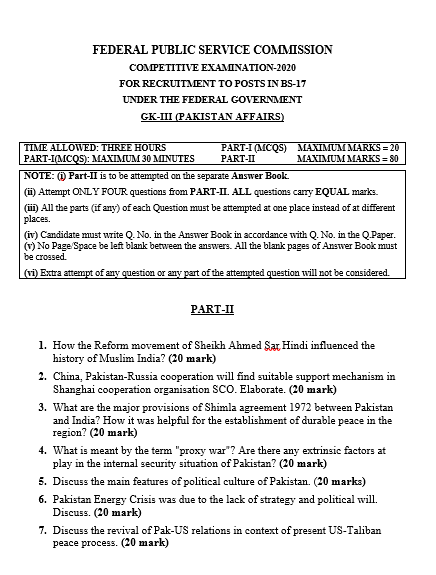CSS Pakistan Affairs Paper 2020
- How the Reform movement of Sheikh Ahmed Sar Hindi influenced the history of Muslim India? (20 mark)
- China, Pakistan-Russia cooperation will find suitable support mechanism in Shanghai cooperation organisation SCO. Elaborate. (20 mark)
- What are the major provisions of Shimla agreement 1972 between Pakistan and India? How it was helpful for the establishment of durable peace in the region? (20 mark)
- What is meant by the term “proxy war”? Are there any extrinsic factors at play in the internal security situation of Pakistan? (20 mark)
- Discuss the main features of political culture of Pakistan. (20 marks)
- Pakistan Energy Crisis was due to the lack of strategy and political will. Discuss. (20 mark)
- Discuss the revival of Pak-US relations in context of present US-Taliban peace process. (20 mark)
Summary of Questions
How the Reform movement of Sheikh Ahmed Sar Hindi influenced the history of Muslim India?
Sheikh Ahmed Sar Hindi’s reform movement in the 16th century aimed to counter Akbar’s syncretic policies and revive orthodox Islamic principles. By emphasizing the distinctiveness of Islamic identity, he inspired future leaders to resist assimilation and maintain religious values. His teachings reinforced Muslim unity and played a key role in shaping the socio-religious landscape of Muslim India.
China, Pakistan-Russia cooperation will find suitable support mechanisms in Shanghai Cooperation Organisation (SCO). Elaborate.
The SCO serves as a platform for China, Pakistan, and Russia to enhance economic and security collaboration. It facilitates joint initiatives in counter-terrorism, regional connectivity, and trade. Through the SCO, these countries can strengthen their geopolitical alliances and address mutual challenges, fostering stability and growth in the region.
What are the major provisions of the Shimla Agreement 1972 between Pakistan and India? How was it helpful for the establishment of durable peace in the region?
The Shimla Agreement aimed to normalize relations between Pakistan and India after the 1971 war. Key provisions included resolving disputes bilaterally, respecting the Line of Control (LoC) in Kashmir, and avoiding the use of force. While it laid the groundwork for peaceful coexistence, its implementation faced setbacks due to continued mistrust and conflicts.
What is meant by the term “proxy war”? Are there any extrinsic factors at play in the internal security situation of Pakistan?
A proxy war involves indirect conflict through third parties, such as militias or insurgent groups. Pakistan’s internal security issues, including terrorism and insurgency, are influenced by external factors like regional rivalries and foreign involvement. Addressing these challenges requires countering external interference and strengthening internal resilience.
Discuss the main features of political culture in Pakistan.
Pakistan’s political culture is shaped by its history, featuring elements like strong family-based politics, patronage systems, and a centralized power structure. Frequent military interventions, weak democratic institutions, and public distrust also characterize its politics. However, increasing youth participation and awareness signal a shift toward a more active and democratic culture.
Pakistan Energy Crisis was due to the lack of strategy and political will. Discuss.
Pakistan’s energy crisis stems from poor planning, outdated infrastructure, and reliance on costly imports. Political indecision and a lack of long-term strategies to diversify energy sources have exacerbated the problem. Addressing the crisis requires investments in renewable energy, modernizing infrastructure, and implementing consistent policies.
Discuss the revival of Pak-US relations in the context of the present US-Taliban peace process.
The US-Taliban peace process has brought Pakistan and the US closer due to Pakistan’s role in facilitating negotiations. This cooperation has revived bilateral ties, with a focus on achieving regional stability. While progress is evident, mutual trust and alignment of long-term interests remain crucial for sustainable relations.
